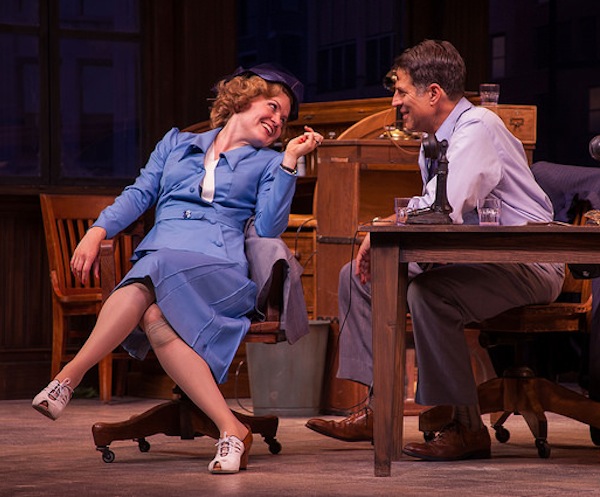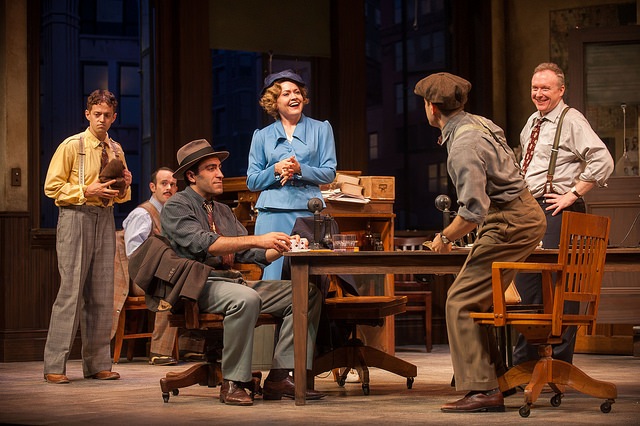Fuse Theater Review: BSC’s “His Girl Friday” — Fast Action on the Chicago Beat
His Girl Friday is a stirring celebration of the power of journalism that not only amuses but manages to be troubling as well.
His Girl Friday adapted by John Guare from the The Front Page by Ben Hecht and Charles MacArthur and the Columbia Pictures film His Girl Friday. Directed by Julianne Boyd. Staged by Barrington Stage at the Boyd-Quinson Mainstage, 30 Union Street, Pittsfield, MA, through August 30.

Christopher Innvar as Walter Burns and Jane Pfitsch as Hildy Johnson in the Barrington Stage Company production of “His Girl Friday.” Photo: Kevin Sprague.
By Kate Abbott
It’s late night in a Chicago press room in 1939. Camped out in city hall, with the condemned cell behind a door and a gallows outside the window, reporters from the city papers are waiting for a hanging.
Hildegard Johnson (Jane Pfitsch), once the best journalist in the city, drops in between trains to say goodbye to the newsroom, on her way to marry Bruce Baldwin (Mark H. Dold). Hildy walks into what could be the biggest story of her career. Her former husband and editor, Walter Burns (Christopher Innvar), believes the condemned man is a political target, and he wants her help — at the risk of her engagement, her liberty, and her life.
Dramatist John Guare has adapted a new script from Ben Hecht and Charles MacArthur’s 1928 Broadway comedy The Front Page and the 1940 screwball film version, His Girl Friday with Cary Grant and Rosalind Russell. He sets the action on the edge of World War II. It’s a fast-moving comedy and at times a classic farce — the incompetent sheriff, the battle-axe mother-in-law, the press hacks, Walter’s antic attempts to separate Hildy from mama’s-boy Bruce.
But the laughs play against a serious background. An anarchist Jew is condemned for shooting a policeman who would have shot him; political corruption and fear are driving a Chicago election; Franklin Delano Roosevelt, facing the Depression, urges the U.S. to war as Hitler comes to power in Germany; the rookie reporter whose wife is about to have a baby could be drafted before his children are old enough to walk.
Farce at its strongest often has a hard edge. It sets you laughing and then hits you with something real (desire, fear) under the humor. With the BSC cast, even purely comic characters came off as three-dimensional. Bruce Baldwin and his unthinking political views could have sounded simply ridiculous, but Dold made him chilling. His unthinking hard-line stance is frightening here — a town thinking like this has set up a man to be hanged, and a country thinking like this has put the Nazis in power.
In characters given more depth, actors moved smoothly between slapstick and complexity. Walter has an editor’s energy and will to take charge and to make change. Innvar beautifully portrays an honest newsman soured by cynicism. Pfitsch catches Hildy’s spirit as an independent woman of the time — bright, powerful, and self-doubting, and with her own kind of stubbornness. She is clear-headed, improvisational, and always ready to take initiative. She is also wonderfully difficult to con. Walter manipulates her new fiancé because he can’t manipulate her. Walter gets under Hildy’s skin in one way — by knowing she loves her work. It is one of the play’s keenest pleasures that Hildy is good at her job. Walter proclaims it. The action revolves around it. Walter wants her back because he wants her, but he wants her to write this story because she can get it better than anyone else. Pfitsch’s Hildy knows how good she is and delights in it.
In contrast, the newsroom crew are comic hacks: they make up events, investigate nothing, and repeat whatever line the mayor gives them. Theirs isn’t the cynicism of the cops-and-courts guy who has seen too many shoddy cases — that guy still calls the DA’s office and challenges the cops. These guys are too jaded or too scared for their paychecks to do their jobs. In their way they are as frightening as Bruce, who argues that America should sell arms to Germany. With Rocco Sisto, the sheriff, to bait, the reporters are also a darkly funny crew.
Set against them, Walter stands up for the ethics of journalism. At his best he has the courage to defy the political structure. At his worst he sounds like the arrogant, poker-playing pressmen with their casual racism. You understand why Hildy left him and why she married him in the first place.
At her most inspired, Hildy talks down an escaped prisoner with a gun and draws out of him some of the most powerful lines in the play. Ethan Dubin as Earl Holub is riveting. In a few words he challenges civic authorities, stands up for American values, puts the country on trial for its neutrality in Europe and its treatment of his people, indicts a police officer for fascism, and tells his own story. Of course, Hildy gets him to say it. That’s what journalists do. And then they get the story into the world. If they tell that story strongly enough, Hildy and Walter can save a man’s life, change an election, and even push a country into war.

Jane Pfitsch as Hildy Johnson and other cast members in the BSC production of “His Girl Friday.” Photo: Kevin Sprague
The entire cast moves fluidly between farce and serious emotions with sure timing. When friction comes in the production, it comes because the script set’s the story’s antic comedy against the tougher dramatic elements. The imbalance is most glaring in Act II. Some of the most powerful moments in the play, and the saddest, come early in the act. After a pivotal scene, a character makes a deliberate sacrifice that, for a while, manages to save a life. Following that, the Keystone-cop-style romping begins to frustrate. The clowning is colorful, razor sharp, and even hilarious. Walter’s dodges to outwit his funny foes, especially the sheriff, are gleefully bright, but the comedians get in the way of the main action.
Worse, the comic chase scenes ended up making the play’s central conflict politically irrelevant. His Girl Friday puts enormous pressure on Hildy to finish her story and Walter to get it printed. It’s the best lever they have to battle injustice, shifting public opinion by influencing people in power. They want to expose corruption, save the condemned man, and keep themselves out of jail. Walter thunders forcefully about his and Hildy’s responsibility to speak for people who can’t speak for themselves. The piece will make a difference to Hildy’s own life, her work, her passion. In a play that revolves around the power of the press, you want her to succeed and publish her story.
But Guare does not let Hildy’s story make a difference to the political action. The newspaper with the damaging story has not yet hit the streets, and the mayor and the sheriff have ample ways to stop the presses. Guare brings in another character and contrivance to force the issue; that means that the Chicago plot arc, which drove most of the evening, abruptly peters out. Walter and Hildy are coming into their own, finding the truth, protecting the innocent — they crackle with power. But they never get to turn that force on the city.
Still, they do get to turn it on each other, and they promise to turn it on the wider world. Guare brings their conflict and international political conflict vividly together in a celebration of the power of journalism that amuses and disturbs at the same time.
Kate Abbott, a writer based in Western Massachusetts, served as editor of Berkshires Week and then Berkshires Week & Shires of Vermont magazine, a year-round weekly arts and coltural publication in the Berkshire Eagle, Bennington Banner, and Manchester Journal newspapers from 2008 to 2015. She holds an M.F.A. in fiction from the University of New Hampshire and has published poetry in journals including the Comstock Review and Entelechy International. She enjoys talking with people, walking in the woods, playing contradance recorder, and writing about all three.
Tagged: Barrington Stage Company, His Girl Friday, John-Guare, Julianne Boyd
